Python 3.5: Getting to grips with type hints
• 6 min read
If you’ve written Python code using an IDE, you might have found that the IDE does a reasonable job at inferring types of function arguments and return values. But, you may have also run into instances when the IDE failed to deduce the type of an argument or of a value returned by a function.
One implication of the IDE not knowing the type of an object is that it stops
code completion suggesting anything particularly useful. For example, here,
PyCharm doesn’t know the type of the elements of the all_users list:
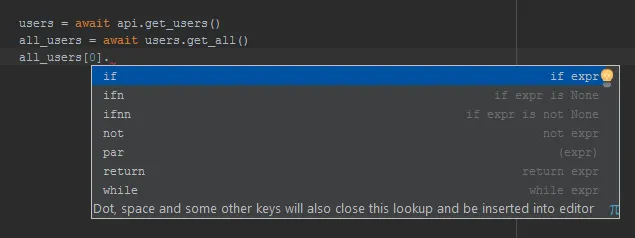
That’s a slightly more complex example, but I was curious: could type hints in
Python 3.5 tell PyCharm what type the elements of my all_users list have?
Back up. What are type hints?
Here’s a simple example of type hints in Python 3.5:
def hello_there(name: str) -> str:
return 'Hello ' + nameHere, the type hints indicate that the name parameter of the hello_there()
function is a string, and that the function returns a string.
I picked the word indicate carefully: type hints aren’t checked at run-time in CPython (at least by default); the main purpose of them is for static analysis (but that does not preclude other uses of them).
They are also optional – you can use them as much, or as little, as you want. For versions of Python older than 3.5, other options exist using either comments or docstrings, but these aren’t covered here as the specific method you need to use may depend on the tool you are using.
Dealing with None
You might inadvertently run into situations like this when you start using type hints.
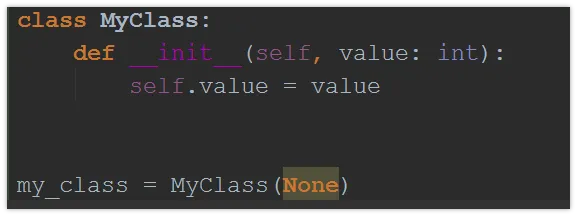
The first thing that’s interesting here is that PyCharm has highlighted None
being used to initialise an instance of MyClass as a problem. Once you start
using type hints, PyCharm will highlight type mismatches like this.
But why is it a type mismatch? Simply because None has a different type from
int. Type type(None) in a Python console, and you’ll get something with a
name of NoneType back.
So how do you deal with situations like this? Enter the
typing standard library module.
In there, we have two relevant things: Union and Optional.
Union is used to indicate a type could be one of multiple types:
def print_plus_one(value: Union[int, float]) -> None:
print(value + 1)So, in the earlier example, we could’ve used Union[None, int] to indicate that
None was an acceptable argument to MyClass’s __init__() method. However,
Optional[TypeA, TypeB, TypeC] is equivalent to
Union[None, TypeA, TypeB, TypeC], so it’s likely to be Optional you’d want
to use in cases like this. Note also that None was used to indicate that the
function does not return anything.
The observant among you may be wondering if using None like this is correct,
as we observed earlier that the type of None is something else. In fact,
type(None) and None are interchangeable in type hints, so you may prefer to
use None (as I do).
Update 23 August 2016
It’s worth noting that you don’t need to use Optional for parameters with a
default value of None as it is automatically inferred (though you can use it
if you wish).
Type aliases
If you’re using a complex type definition multiple times, you can define a type alias using variable assignment:
from typing import Union
T = Union[int, float, complex]
def print_plus_one(value: T) -> None:
print(value + 1)Collections and more
Other useful goodies in the typing module include collection types, such as
Tuple, Sequence, List, Mapping, Dict and Iterable.
Using them is simple. To define a tuple type where the first element is an int
and the second a str, just use Tuple[int, str]. For a list of strings, use
List[str].
Note that it is usually preferable to use Sequence or MutableSequence as the
type of a function parameter (rather than List), as typically you are
concerned about whether it behaves like a list rather than whether it actually
is a list. (Specifically, Sequences and MutableSequences are expected to
implement
the methods defined in the corresponding abstract base classes.)
Another useful type in the typing module is Any (representing any type, for
example when a function can take an argument of any type).
Generics
Most of the collection types referred to above are examples of generics. A
generic type is one where types used in its methods have been parameterised. For
example, the append() method of a List[int] takes an argument of type int,
and pop() similarly also returns an int.
You can extend predefined generic types, such as List and Iterable, by
deriving from them, and defining a type variable (used in a parameter-like way):
>>> from typing import TypeVar, List
>>>
>>> T = TypeVar('T')
>>>
>>> class MyList(List[T]):
... def first(self) -> T:
... return self[0]
...
>>> numbers = MyList(range(5, 10))
>>> print(isinstance(numbers, list))
True
>>> print(numbers.first())
5You can also define completely new generic types:
from typing import TypeVar, Generic
T = TypeVar('T')
class Object(Generic[T]):
def __init__(self, value: T) -> None:
self.value = value
def get(self) -> T:
return self.value
def create_object(value: T) -> Object[T]:
return Object(value)create_object() is an example of a generic function. The type of its return
value depends on the type of its argument.
Note that deriving from a predefined generic type isn’t necessarily the same as deriving from the corresponding abstract base class.
The
documentation for typing.Iterable
says:
class typing.Iterable(Generic[T_co])
A generic version of the collections.abc.Iterable.
That may make you think that deriving from it is the same as deriving from the abstract base class, but it’s easy to see that it’s not:
>>> import typing
>>> from collections import abc
>>>
>>> T = typing.TypeVar('T')
>>>
>>>
>>> class MyIterableTyping(typing.Iterable[T]):
... pass
...
>>>
>>> class MyIterableAbc(abc.Iterable):
... pass
...
>>>
>>> MyIterableTyping()
<__main__.MyIterableTyping object at 0x000001EAC9E98320>
>>>
>>> MyIterableAbc()
Traceback (most recent call last):
File "<stdin>", line 1, in <module>
TypeError: Can't instantiate abstract class MyIterableAbc with abstract methods __iter__Despite __iter__() not being implemented, we were allowed to instantiate
MyIterableTyping. As you can see, that wasn’t the case for MyIterableAbc,
where instantiation caused an exception to be raised. You can derive from both
typing.Iterable and collections.abc.Iterable, though, should you wish to.
Update 26 March 2017 This appears to have been fixed as of Python 3.5.3 and
3.6.0, so there’s no longer a need to additionally inherit from
collections.abc.Iterable.
Getting type hints programmatically
If you have a need to, typing.get_type_hints() can be used to programmatically
inspect type hints:
>>> from typing import get_type_hints
>>>
>>> def hello_there(name: str) -> str:
... return 'Hello ' + name
...
>>> get_type_hints(hello_there)
{'return': <class 'str'>, 'name': <class 'str'>}Forward referencing types
Sometimes, you’ll need to reference types that are yet to be defined. A simple example is a class that references its own type. You can simply put the type name in single quotes to forward reference it:
class Node:
def get_parent(self) -> 'Node':
...What about variables?
Variables can’t be annotated in the same way as functions, but you can use type comments if you find that you need to annotate variables. Here’s a simple example:
my_var = [1, 2, 3] # type: List[int]Back to code completion
Armed with all this knowledge, I was able to annotate the get_all() method in
the original screenshot to indicate that it returns a list of Users. And
now, PyCharm knows the list elements are Users:
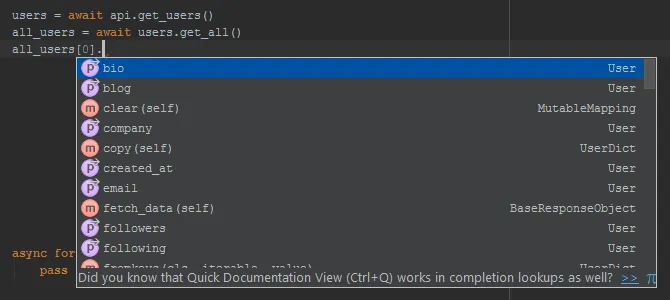
Great!
Collecting types automatically in PyCharm
PyCharm 2016.1 has an option to collect type information when debugging (disabled by default as of time of writing):
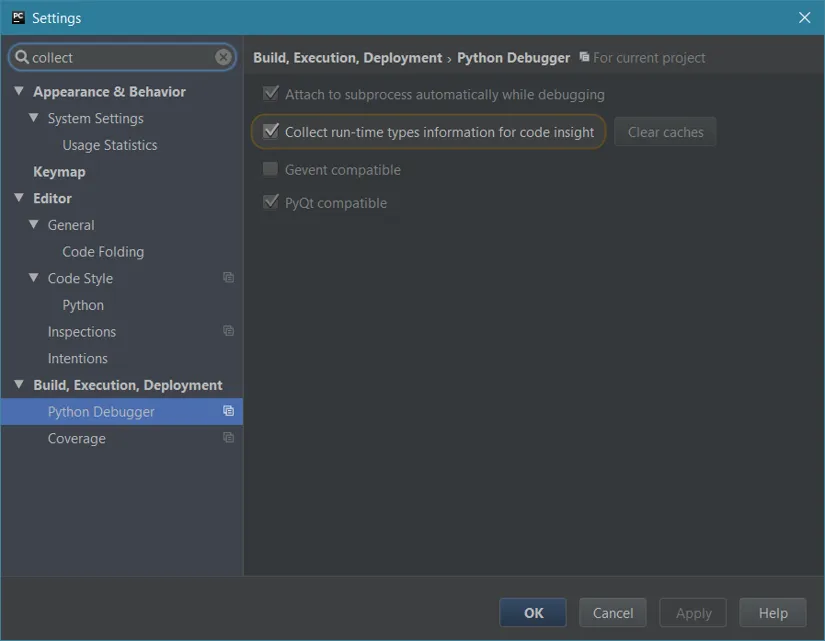
You can then insert type annotations into your code:
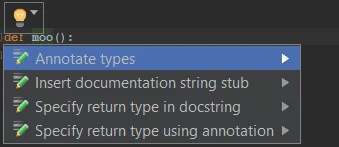
However, I’d be careful when using this because it can pick up very specific types when a more generic type may be more applicable.
Further reading
That was an introduction to type hints, but there are plenty more details that haven’t been covered. These include:
- Covariance and contravariance
- Stub files (type hints put in a separate
.pyifile) - Casts
- Callables
As further reading, I’d recommend the following:
- PEP 483 – gives a bit more background information on type hints
- PEP 484 – essentially the type hints specification
- The documentation of the typing standard library module
- The mypy static type checker tool website
I haven’t had much of a chance to use mypy yet, because it doesn’t yet support the async and await coroutine syntax of Python 3.5. Also note that the package name on PyPI is mypy-lang, not mypy!